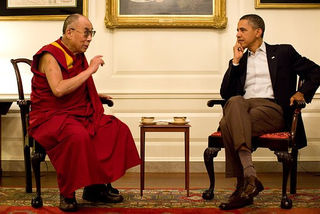Relationships
52 Ways to Show I Love You: Accommodate Differences
Differences that challenge lovers can be resolved by mindful accommodation.
Posted August 27, 2017

Central challenges in all close love relationships lie in acknowledging, respecting, and appreciating differences between two people. No matter how similar you may see yourselves to be, chances are that part of the magic you share is an attraction to precisely those differences. Art and Elaine Aron call this attraction “self-expansion theory.” The central notion is that we are drawn to others we admire whose differences complement our own, and this attraction can blossom into love as two people learn and grow from being close to each other.
Nonetheless, the differences that fuel the flames can bring their own demands. This week I ask: What are some of the most common of the salient differences and what are some ways of coping with them?
What are some of the differences between lovers that can challenge us:
- Limitations. We are all born with potentials to grow in countless ways, but some biological or temperamental realities do constrain possibilities. At this moment in time, a male still cannot bear or nurse a baby. A person born with specific neurological damage to the brain that affects spatial perception may be hard-pressed to ever select the proper container for leftovers. Singing on key is harder for some than for others; high sociability drains some people and excites and invigorates others.
- Preferences. Although increased familiarity with almost anything affects our preferences, nudging them to grow in an appealing or unappealing direction, one person may always favor travel for adventure while the other might prefer travel for indulgence. Both of them may find their preferred mode restorative – but the trips themselves could look quite different.
- Needs. We all share basic biological needs but the amount of food, sleep, and activity that we each require can diverge. Temperamental variations can lead one person to need more order and routines and another to be more flexible. In addition, differences in circadian rhythms can make a relationship between a “morning” person and a night owl demanding.
- Wants. Beyond our needs, we have wants, those goals that we expect may bring us something we desire. When one person wants comfort and another wants excitement, accommodation is necessary. It is hard to climb a mountain carrying a mattress with feather pillows on your back.
- Distance desired. A full post will be devoted to the topic of interpersonal “distance” desired, but for today, in the context of differences that require accommodation, let’s just say that people vary in how much physical, emotional and psychic contact they find comfortable, desirable, or, sometimes, threatening. Often what feels cozy and nurturing to one person can feel suffocating to another.
How can we deal with these differences?
- Ask “how much does it matter?” Sometimes one person cares a great deal and the other not at all. I have far fewer food preferences than my husband, but I have many more preferences in movies I am willing to watch. We each are happy to usually — although not always — accommodate to the other's preference, simply because the choice means much more to the other.
-
 Source: janeb13/Pixabay
Source: janeb13/PixabayMake conscious choices. A cornerstone of a close relationship, making conscious choices invites two people to explore what they gain and what they lose in a decision. Although this may sound highly “transactional” and thus out of place in a love relationship based more on “family values” (i.e., the people involved will take care of each other and inevitable inequities are assumed), awareness can permit two people to see each other’s point of view. They can then find creative ways to address a difference. Take turns? Consider external stressors? Examine a core shared value and find a method consistent with it? To me, price and reliability and color matter in a car. David cares about the engine, the design and, yes, the color too but he and I don't always prefer the same color. Should we become a one-car family, we will need to agree on priorities!
- Making concessions. A recent New York Times article protested the idea of Motherhood as “sacrifice”. Rather, Karen Rinaldi conceptualized it — and experienced it — as selfishness, a privilege. The same is true for close romantic relationships. They are a gift. Being able to support a loved one by setting aside wants and preferences (but not needs) can be rewarding in itself, allowing us the spiritual practice of generosity. The key is to be sure that ways to tend to one’s own needs are always preserved and can be protected within the relationship.
- Distinguish among giving, giving in, and giving up. These choices are not the same. “Giving” sparks those feelings of generosity that nurture the spirit. “Giving in” can feel like a way to move along on a playing field that ultimately feels level. “Giving up” rarely helps anyone and can breed silent resentment, feeding an eventual rupture. Abdicating your responsibility to be sure your basic needs are addressed does not end well. The consequent dependency is almost guaranteed to breed hostility in both directions.

Why does accommodating show love?
- Accommodation acknowledges the reality of separateness as well as connection. As much as two people newly in love may want to feel that they are mirrors of one another, they are much more. Keeping the differences that add spice to their time together lies at the heart of Aron’s prescriptions for keeping romantic love alive.
- It permits the couple itself to be an entity worthy of priorities. In an earlier post, Recognizing the Relationship, I wrote about the importance of acknowledging that a “we” exists as well as “me” and “you”. The couple itself needs nourishing and, from time to time, personal agendas need to recede to preserve the integrity of that couple.
Have there been times when you gave up something important to you in order to accommodate a want or need of your loved one? How did that feel for you? How did that feel for your loved one? Did your behavior set a precedent – an expectation – that you would always respond in the same way? Could you openly discuss feelings? If you felt disenfranchised, were you then able to get back on the same team?
Copyright 2017 Roni Beth Tower
Visit me at miracleatmidlife.com


